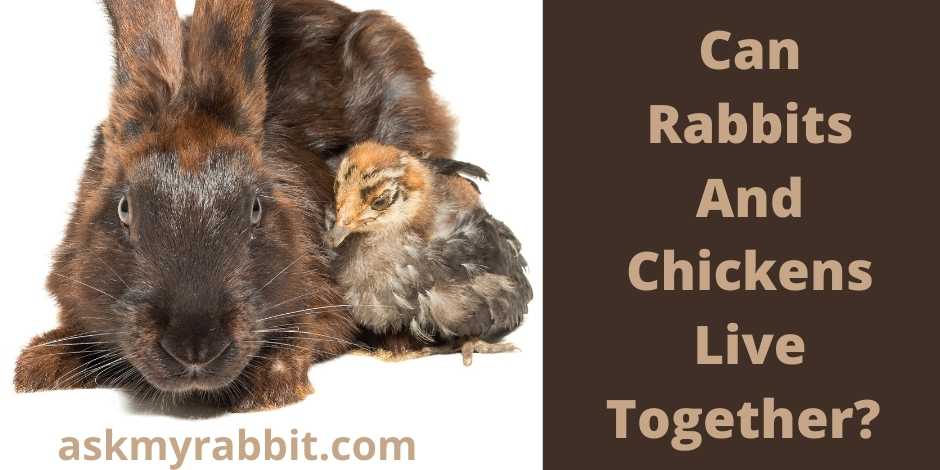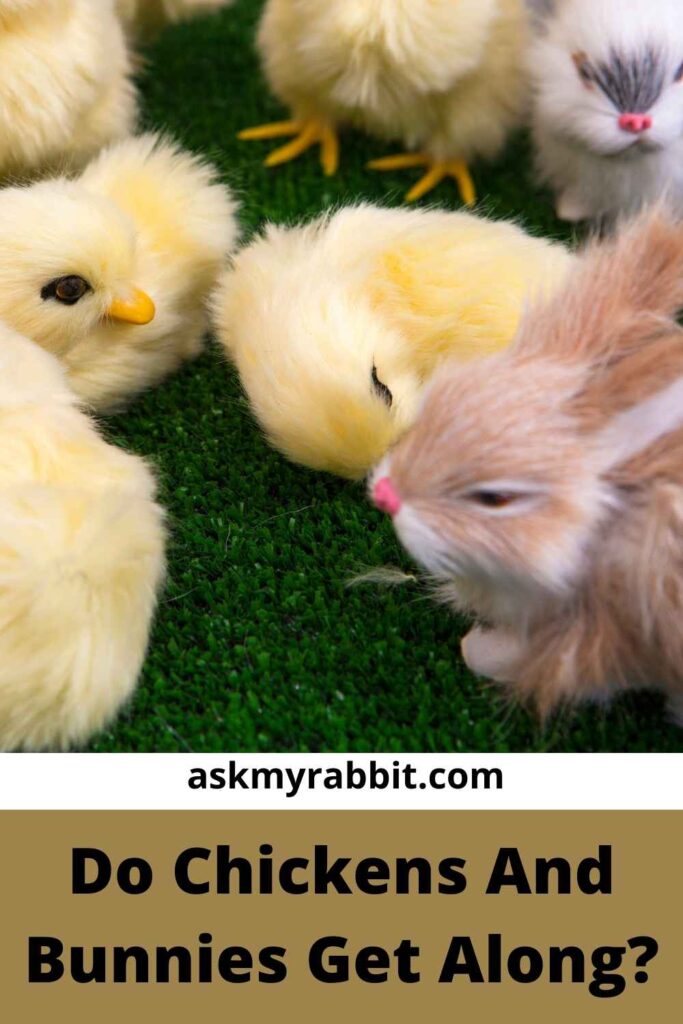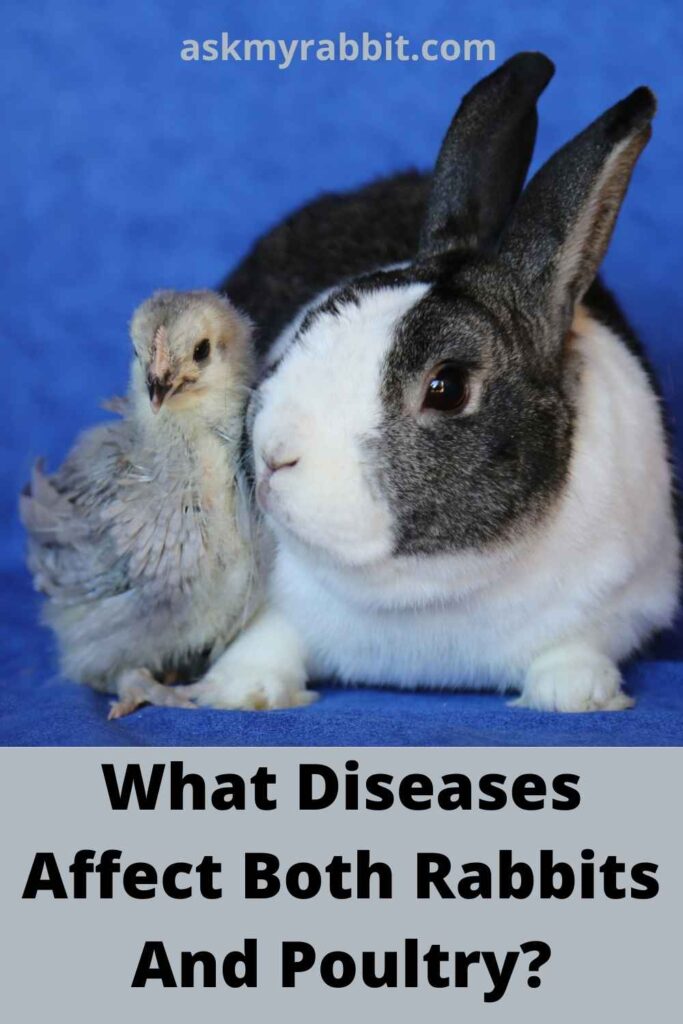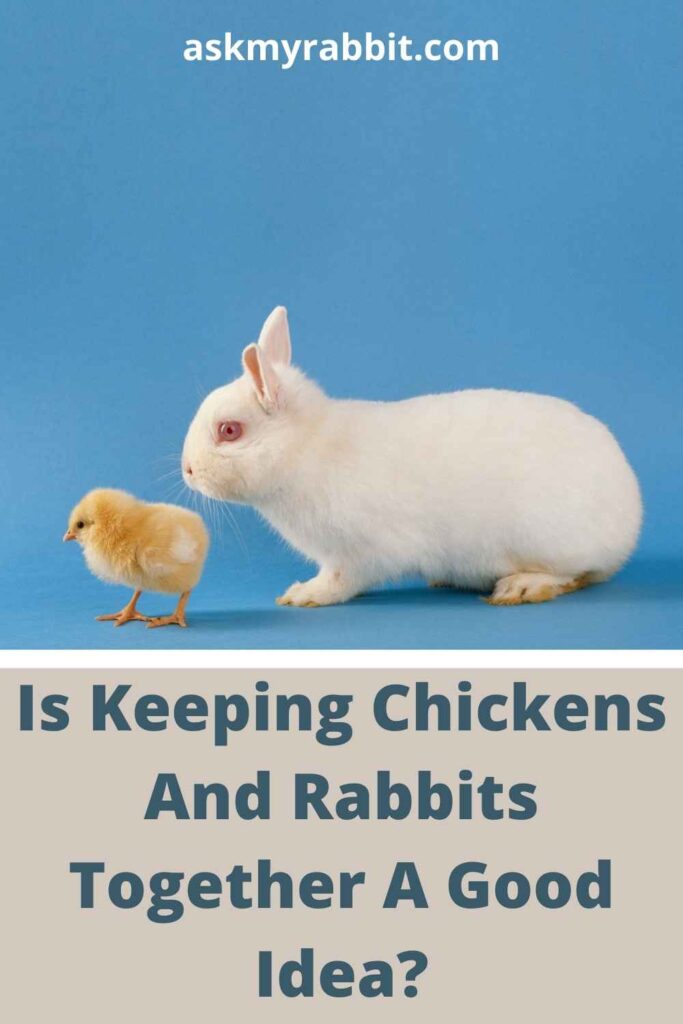Rabbits and chickens are two of the most popular pets in the United States. While they have many differences, they also have many commonalities.
So, can rabbits and chickens live together?
If you are attentive and manage to meet their various requirements, rabbits and chickens may co-exist together.
Chickens and rabbits are both highly social creatures who like spending time with others, regardless of whether the companionship is of a different species. They have comparable needs in terms of space, temperature, and care as well.
Apart from that, having the two live together will save you room because you won’t have to build two separate living quarters and can instead concentrate on one larger place.
There are several things to consider if you want to raise rabbits and chickens together. Simply placing them in a run and hoping for the best will almost certainly not work out.
Chickens may carry diseases that are latent and symptomless and they are naturally afraid of fast-moving objects, including animals. So, having quick rabbits dashing about their feet might cause a lot of stress if they aren’t used to it.
Keep reading if you want to learn how to cultivate a friendship between rabbits and chickens!

Do Chickens And Bunnies Get Along?
Chickens and bunnies may not seem like the most natural companions, but growing and caring for these two creatures together may result in a peaceful home.
Yes, chickens and rabbits may get along. Of course, there is some effort involved in putting together this living arrangement.
Here are some suggestions for getting your bunnies and hens to get along:

1. Introduce Them
It will take some time for them to become used to one other, just as it does when introducing different pets to one another. If at all feasible, introduce them when they are still young so that they can grow up together.
They can, however, coexist as long as the rabbit isn’t a youngster being introduced to a flock of fully grown chickens. Because hens dislike fast moving creatures, they may attempt to peck the rabbit at first.
This has little effect on the rabbit, and they will quickly learn to accept its motions. To begin, confine the rabbit to a sectioned-off portion of the run while the chickens graze. This will allow them to grow acquainted with each other.
2. Give Them Space
It’s critical that both the bunnies and the chickens have enough space to roam, flap, bound, and flop around without getting in each other’s way. If it’s too crowded, they’ll feel anxious. This might lead to further health problems or conflict amongst them.
3. Give Them Their Own Safe Space
Chickens and rabbits are both pretty sensitive species, so having their own small secure and private area to withdraw to is quite important to them. While sharing a run area is excellent, it’s ideal if they each have their own hutch space where they can eat, sleep, and have some time away from one other if they need it.
4. Keep The Area Clean
Rabbits are known for their cleanliness. Take a little additional effort to maintain it tidy to make them satisfied with their living situation. Regularly muck out the run, pick up droppings, and refresh and clean their resting space. You’ll have some happy bunnies and chickens.
5. Don’t Force Friendship
If your two favourite creatures are still not getting along after some time, it may be necessary to separate them. They should not be forced into a friendship. It is better to keep both animals happy and healthy in the long run.
Can Rabbits Get Sick From Chickens?
Yes, rabbits can catch diseases from chickens.
Because there are a variety of illnesses that may be caught by chickens and easily passed to rabbits, it’s important to keep chickens away from any rabbit habitat.
Can Rabbits Get Coccidiosis From Chickens?
Yes, rabbits can get coccidiosis from chickens. It is spread by rabbits who consume chicken excrement.
Rabbits may consume chicken excrement since they eat their own poop. More than often, the parasite will be found in hay or shared water. The rabbit will then unintentionally swallow it.
Chickens must not perch over the sleeping quarters of a rabbit. It might lead to coccidiosis in rabbits.
How To Prevent Coccidiosis In Rabbits?
In order to prevent coccidiosis, the shared coop’s cleanliness has to be improved. Because coccidiosis is transmitted by chicken feces, you must keep your rabbit away from it.
You can clean the hutch once a week if you keep rabbits alone. If you keep your hens alone, you will only need to clean them once in a while.
If you want to keep the animals together, you’ll need to clean up after them on a regular basis. The rabbit will most likely recover completely if the coccidiosis is discovered early.
Will Chicken Poop Make Rabbits Sick?
Yes, chicken poop can make rabbits sick. Chickens’ gastrointestinal tracts and feces transmit a variety of illnesses. It might not bother them, but it can make your rabbits sick, or even kill them.
So be cautious, particularly in terms of how you set up housing. Keep the rabbit hutches away from the hens’ perches.
What Diseases Affect Both Rabbits And Poultry?
A number of diseases affects both rabbits and chickens:

1. Coccidiosis
As a result of infection with the coccidia protozoa, this illness damages the digestive tract of afflicted animals. Because it is a digestive system disease, it is most commonly spread by animals ingesting contaminated excrement.
All it takes is for one’s feces to come into touch with the feces of the other on the ground for issues to emerge.
Coccidiosis In Chickens:
Coccidiosis infection in chickens is most dangerous in chicks and young hens, although it can also be deadly in older hens. The speed with which the disease might take hold is even more terrible. A hen may look to be healthy one day and then be dead the next.
However, it is the worst-case scenario, and you will frequently receive a few signs that anything is wrong if the hen seem poorly in general.
Diarrhea and indications of blood in the stools, as a result of the infection destroying the intestinal lining, are the most telling indicators.
Coccidiosis In Rabbits:
Young rabbits, like chickens, are most susceptible to coccidiosis infection. The intensity of the symptoms varies by rabbit species, and most infected rabbits will not show any symptoms at all. They might, instead, act as carriers of the virus.
If you’ve been keeping your hens and bunnies together and believe one of them is sick, the first thing you should do is take them to the vet. As long as the disease isn’t too serious, sufficient recovery and medicine can get your rabbit back to health.
To avoid the transmission of infection among rabbits, meticulous cleanliness is required. Therefore, moving them out of the chicken coop and into a clean hutch is critical. Even then, you’ll have to keep a close eye on the hutch to keep it clean.
One of the most serious dangers is that rabbits can re-infect themselves by eating their own diseased excrement. Therefore, frequent cleaning is necessary.
2. Salmonella
Salmonella is a well-known bacterial illness that affects nearly all animals. This is one of the reasons why it is so contagious and potentially harmful.
Salmonella is a particular concern among poultry keepers due to the potential of infection spreading through contaminated eggs.
Salmonella may be contracted by hens in a variety of ways, but in principle, if you get them from a reputable breeder who vaccinates against such infections, you shouldn’t have any problems.
Rabbits that have been vaccinated should be clear of the virus, however their proclivity for coprophagy (eating their own excrement) makes them more susceptible to consuming salmonella-infected material that may be found on the ground.
You may increase the chance of transmission across species by keeping rabbits and chickens together. Because animals can be carriers of salmonella but show no symptoms, it can be difficult to detect if the illness is present at all.
Salmonella In Hens:
Chickens are frequently infected with salmonella yet show no symptoms, probably because the bacteria has become so well established in hens that they have evolved to not showing symptoms. While this is beneficial to the chickens, it is risky for you or anybody else who comes into touch with them since you will have no sign that you are at risk of infection.
Adopt all of the greatest cleaning procedures you can within the coop to prevent rats from infiltrating and eating stray feed.
Salmonella In Rabbits:
Salmonella is believed to be quite infrequent in rabbits, therefore they aren’t expected to offer a significant risk of transferring the disease to your chickens. Nonetheless, keeping the two animals together is probably not worth the risk.
3. Pasteurella Multocida
Pasteurella is another bacterial illness that is known to spread between various animal species. In this situation, the more difficult mode of transmission is from chickens to rabbits.
Rabbits will develop respiratory illness if infected with pasteurella, thus keeping them near chickens poses a significant danger, despite the infection being very rare.
Pasteurella Symptoms In Rabbits:
Pasteurella, like other bacteria, comes in a variety of strains, some of which are more dangerous than others. The illness in rabbits can be moderate or severe, depending on the strain they have, and they may not show any signs at all unless they are already exhausted from another sickness or stress.
Pasteurella infection has symptoms similar to a cold or flu in people. If the rabbit scratches his face with his paws, the infection can spread to his eyes, causing conjunctivitis, or to his ears, causing ear infection.
A veterinarian will be able to determine if antibiotics should be administered for the illness. This is a difficult decision to make because medicines can wipe out beneficial bacteria in the rabbit’s stomach, which can cause issues of its own.
Can Chickens Spread Disease To Rabbits?
Yes, chickens can spread disease to rabbits. Salmonella is a disease that affects many hens yet causes no symptoms. This implies that the hens may unknowingly infect a rabbit.
However, not all rabbits exhibit signs of the illness.
The possibility of coccidiosis is a bigger worry. When a parasite attaches itself to a chicken’s digestive tract, the illness develops. This illness can be deadly to chickens and rabbits if it is spread.
Can Rabbits And Chickens Eat The Same Food?
No, rabbits and chickens cannot eat the same food. Chickens and rabbits require various types of nourishment. It can create serious nutritional deficits if your chickens consume your rabbit chow or vice versa.
Both species are likely to eat each other’s food unless the food is divided by species. To ensure good mating and a healthy litter of young bunnies, a rabbit’s diet must be closely managed.
Do Rabbits Attack Chickens?
Rabbits are tiny creatures with enormous hearts. However, they may attack chickens if they feel threatened. This is a potentially perilous situation.
When a rabbit is irritated, it may be rather aggressive. Rabbits are territorial as well. If they believe a chicken is invading their territory, they may turn hostile.
This is why it’s critical to introduce animals while they’re young. In this manner, the rabbit is more likely to tolerate sharing their space.
The following are warning indications that a rabbit is preparing an attack:
- The sound of the back foot pounding.
- Ears tucked behind the head and against the torso.
- Taking a boxer’s stance while standing on the back legs.
- Grunting and growling
Remove the rabbit from the coop for a time out if you see these behaviours. Take action right away.
You might also have to keep an eye out for a rabbit pursuing hens. They may want to rip the chicken’s feathers out if they are angry.
Allow the rabbit to chase for a while and watch what happens. It’s simply a game if it pulls away at the final second.
Chickens are agile, and they appear to be having a good time. Separate the animals as soon as teeth/claws appear.
Would A Rabbit Damage A Chicken’s Eggs?
In principle, a rabbit will be uninterested in the eggs of a chicken. Rabbits are herbivores and have no reason to believe that eggs would taste nice to them.
Regardless, keep in mind that rabbits are curious creatures. They may be perplexed as to what this unusual object in their home is.
They will be motivated to explore as a result of this. They’ll push, sniff, and maybe shatter the eggshell.
Because chickens are protective of their eggs, tampering with them by a rabbit might result in a fight.
Do Chickens Attack Rabbits?
Chickens aren’t very fond of fast-moving creatures. This might be a problem initially since rabbits enjoy running. When the two species first share a place, there may be some growing pains.
A peck from the chicken to the passing rabbit is most likely to occur. If all goes well, the rabbit will be unaffected.
It shouldn’t harm it in any way. The chicken will eventually quit behaving in this manner.
Is Keeping Chickens And Rabbits Together A Good Idea?

You can build a peaceful multi-species home with the appropriate care. However, you can’t just throw a few of rabbits in a chicken coop and hope for the best.
Animals like chickens and bunnies are fragile and frightened. They require time to get to know one another and have distinct requirements.
It is possible to maintain hens and bunnies together with time and effort. All animals have the ability to form unexpected bonds.
Despite this, there are basic ground rules that must be followed.
Chickens and bunnies will only accept each other if the following conditions are met:
- Introduce them when they’re young. As they become older, both species will become more set in their ways and intolerant.
- Male rabbits will mount whatever they see. Therefore they must be spayed or neutered. This might be a sexual act, or it could be a domineering act. Neutering will calm them down in any case.
- Rabbits have a cleaner habitat than hens. If they’re surrounded by filth, they’ll become disturbed.
- They’ll become overwhelmed if they don’t believe they have enough space or solitude.
- A hutch for your rabbit may be included in the coop. They will not only feel safer, but they will also be cleaner.
- Each animal will feel less worried and lonely if there are two of them.
If the connection begins to deteriorate, separate the animals immediately to avoid violence.
How To Introduce Rabbits And Chickens?
Rabbits and chickens must meet while they are young if they are to live in peace. Before introducing a male rabbit, wait until he is old enough to be neutered. It not only helps to suppress romantic impulses, but it also relaxes rabbits.
You can use the tips below to introduce your rabbits and chickens:
- Both species should be introduced on opposite sides of a fence. Allow them to acquire a sense of each other from afar.
- Allow them to run about together uninhibitedly. They may first ignore each other, but this indicates that they do not feel endangered.
- Allow the chickens to roam the coop while the rabbits are kept in the run. Reverse these responsibilities after a while. Both species will eventually become accustomed to sharing space.
- Keep an eye out for territorial rabbits that will zealously protect their territory. Ascertain that they are aware that the coop is a common place. This approach will be aided by providing a unique, rabbit-only refuge.
What Are The Advantages Of Chickens And Rabbits Living Together?
Keeping chickens and bunnies in the same coop has a number of advantages. The following are some of them:
1. Space
It is more space-efficient to keep all of your animals in one huge coop than having each species of animal in its own house.
2. Company
Chickens will keep your rabbit company if you can’t keep him inside. You’ll be surprised at how well these animals get along, provided that they’re introduced early enough.
3. Safety
Chickens and rabbits are both prey animals that are hunted by the same predators. They’ll feel safer if they’re in a group.
4. Smell
Rabbits are clean, but their excrement has a strong odor. Chickens are less forgiving, so you’ll have to clean the coop on a frequent basis. This implies that your rabbit will have a cleaner environment to live in.
5. Temperature
Rabbits and hens are tough animals that do well in the cold. In the cold, they both thrive. It’s unnecessary to be concerned about one species requiring more heat than the other.
What Are The Disadvantages Of Chickens And Rabbits Living Together?
There are some advantages of chickens and rabbits living together. They are:
1. Dietary Requirements
Rabbits and hens have distinct nutritional requirements. They could become sick if they consume each other’s food. Rabbits would need to be fed separately.
2. Characteristics
Chickens and rabbits are as unlike as apples and oranges. Fast-moving creatures frighten chickens, which can lead to pecking, clawing, and fighting among them.
3. Rabbits
Rabbits and chickens are both susceptible to a variety of zoonotic illnesses. They could also have parasites in common.
4. Cleanliness
This is both a benefit and a disadvantage. Rabbits are far more hygienic than hens. This implies you’ll have to clean out the coop on a daily basis. Although this minimises the danger of flies and parasites, it is time consuming.
5. Mating
Every chick in the coop can be mounted by a male rabbit. Neutering will assist, but it may not be enough to completely eliminate the habit.
6. Coop Materials
Rabbits have sensitive skin and may injure themselves if they are left alone in a wire chicken cage. We advise that you items that are appropriate for both species.
7. Digging
Because rabbits enjoy digging, you’ll need hard floors to keep them from escaping. The chickens’ feet may find this flooring to be unpleasant.
Frequently Asked Questions
Can Chickens Make Rabbits Ill?
Chickens may carry illnesses that are asymptomatic and will be unnoticed by humans. However, they can make rabbits sick.
Will Rabbits Eat Chicken Eggs?
Rabbits cannot eat chicken eggs since they are unhealthy for them and would harm their stomachs if consumed.
Is It Okay To Have One Rabbit?
While rabbits require solitude from time to time, they detest being alone. Because rabbits are sociable animals, a lonely and unhappy bunny is probable. Keeping rabbits in pairs is always a good idea.
Final Words
Rabbits are kind, tidy, and simple to get along with. Chickens are entertaining and courageous, but they aren’t really clean, if we’re being honest.
There are advantages and disadvantages to keeping them together, which is why, if you decide to tow this section, you should do so correctly.
If rabbits and chickens are introduced while they are young, they can share a hutch. They’re unlikely to fight and can form strong bonds.
There must be precautions taken. You’ll need a big coop, and you’ll have to be careful about health issues. Chickens can infect rabbits with illnesses that have no symptoms.
There are methods to make their cohabitation go smoothly, as well as ways to make life a living nightmare for you, the owner. It is ultimately up to you to choose which route you will choose.
Drop down your queries regarding your pet bunny in the comment section below. We will answer them soon.







